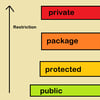Disclosure: This post includes affiliate links; I may receive compensation if you purchase products or services from the different links provided in this article.
Photo by Brendan Church on Unsplash
If you are an experienced developer or a senior Java programmer, like someone with more than 5 to 8 years of experience, and wondering how to get to the next level, then you have come to the right place. In this article, I'll share five career options that an experienced Java developer like yourself can choose to take your career to the next level.
Apart from becoming a project manager, which is the path many senior programmers chose, there are other technical and better career opportunities available now. It's especially great for programmers with lacking people management skills and love coding, development and remaining hands-on.
It's important for you to choose the right career option, depending upon your personal skill set, because becoming a project manager or going into people management without having those skills could be frustrating at times, mainly, because you don't want to get frustrated while getting a job done by developers when you can do it easily.
People management is also a very different skill where you need to work closely with both higher and lower levels like you need to talk regularly with businesses, executives, and other higher management to chalk out deliveries. But, you also need to work with developers, QA, and other resources to get that job done. It's not easy, especially if you have to manage a big team.
On the other hand, a more technical career path, like becoming a DevOps specialist, a Scrum Master, or a Software Architect is better for programmers who always want to remain hands-on and close to technology.
There is a lot of demand for an experienced and skilled programmer, and you should never think that you will be obsolete and out-of-market if you keep doing coding for years.
Many organizations, like investment banks, are also promoting this technical career path, where you can go to high-level position, vice president, and executive director by remaining technical and good at your job.
Top 5 Career Options for Experienced Programmers
Anyway, without wasting any more of your time, here is my list of some of the best career options that an experienced Java developer can pursue to take his career to the next level.
1. Scrum Master
If you have worked in an Agile environment, then you definitely have heard about Scrum meetings and Scrum master. The job of a Scrum Master is to run a Scrum meeting daily and solve any blocker that is coming your way. It requires a little bit of project management and coordination skills.
This is a relatively new career option when compared to the business analyst or project manager, but it is becoming increasingly popular among companies that follow Agile methodologies for development.
If you have a good experience with your project and business area, then you can become a Scrum Master, too! but if you are not familiar with Agile, I suggest you take the Agile Crash Course: Agile Project Management; Agile Delivery to get yourself familiar with Sprint, Scrum, Kanban, and other Agile methodologies and tools.
You can learn some essential Scrum skills or acquire a Scrum certification to further improve your chances.
2. DevOps Engineer
This is another new opportunity for experienced developers. There's no formal career track for becoming a DevOps engineer.
They are either developers who get interested in deployment and network operations or sysadmins who have a passion for scripting and coding and move into the development side where they can improve the planning of tests and deployment.
This means that if you are an experienced Java programmer with a passion for managing the environment, automation, and improving overall structure, you can become a DevOps engineer.
If you are looking for some awesome resources, then Learn DevOps: CI/CD with Jenkins using Pipelines and Docker is a great course to start with, particularly for Java developers.
I have also shared, The Complete DevOps Developer RoadMap, one of the comprehensive resources for becoming a DevOps Engineer.
3. Solution Architect
A solution architect is responsible for the design of one or more applications or services within an organization and is typically part of a solution development team.
They must have a balanced mix of technical and business skills and will often work with an enterprise architect for strategic direction.
The job of a solution architect is to translate requirements created by functional analysts into the architecture for that solution and describing it through architecture and design artifacts.
In order to be an effective solution architect, you should have a good understanding of the fundamentals, like data structure and algorithms as well as system design and design patterns.
If you are looking to refresh your knowledge, then I suggest you start with Data Structures and Algorithms: Deep Dive Using Java to get a review of all the essential data structures and algorithms.
If you need courses, I have also jotted down some of the best courses to become a solution architect for senior programmers and developers.
If you like books, then you can also read my list of 5 must-read books for Solution architects or software architects.
4. Project Manager
The project manager is responsible for the day-to-day management of the project and must be competent in managing the six aspects of a project, i.e. scope, schedule, finance, risk, quality, and resources.
As a project manager, your job is to plan, budget, oversee, and document all aspects of the specific project you are working on. Project managers may work closely with upper management
If you are new to project management and struggling to get control over your project, I suggest you start withBeginning Project Management: Project Management Level One, one of the better courses to understand project management basics.
I highly recommend this course to all developers who aspire to become a project manager. If you like, you can also go for PMP certification to become a certified Project Manager, very useful for your career progression in a quick time.
5. Business Analyst
The analyst is involved in the design or modification of business systems or IT systems. The analyst interacts with the business stakeholders and subject matter experts in order to understand their problems and needs.
An analyst also gathers documents and analyzes business needs and requirements. If you are new to business analysis and wondering about your role, I suggest you take a look at the Business Analysis Fundamentals, one of the better courses on the topic.
I highly recommend this course to both aspiring business analysts and developers who have business analysis as part of their job.
That's all about some of the career options for experienced Java programmers, like someone with 8 to 15 years of experience. I know, many of you don't want to go into people management path and want to remain hands-on with coding and whatever you are doing at the moment.
If so, then you should choose between a solution architect and DevOps engineer. Both are a very hands-on role, and you will remain working with technology.
On the other hand, if you are now thinking to move away from coding and want to explore more options in leadership and people and product, then scrum master, business analyst, and project manager roles are great for you.
Another option is to go into Developer Relations. More and more organizations open their APIs to external developers, which means they need Developer Advocates.
Other Articles You May Like to Explore
The Java Developer RoadMap
10 Things Java and Web Developer Should Learn
10 Testing Tools Java Developers Should Know
5 Frameworks Java Developers Should Learn
5 Courses to Learn Big Data and Apache Spark in Java
10 Courses to learn DevOps for Java Developers
10 Books Every Java Programmer Should Read
10 Tools Java Developers uses in their day-to-day work
10 Tips to become a better Java Developer
Thanks for reading this post! If you like this article, then please share it with your friends and colleagues. Also, if you have any questions or feedback, then please drop a note in the comments below!











Top comments (4)
Nice article!
Don't forget lead engineer or HR manager. I'm personally a software engineering manager watching over a team of 4 and still writing plenty of code myself.
My own insight into the scrum master role is that it's one best suited to give to non-management employees as a way to develop their own leadership skills as they look to foster communication.
Matt thanks for pointing this out, you do not always have to stop writing code (I circled back from 3 year management stint)
In addition to Lead Engineer, there is always the Developer Advocate/Evangelist who drives adoption and use of best practices within the craft in an organisation across teams and across initiatives
Great!
Great!